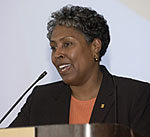Campus News
Diversity Training on the UAlbany Campus
by Greta Petry (November 22, 2005)
 |
Joanne Woodard of North Carolina State University. |
Numerous workshops have been held this semester on the UAlbany campus to help faculty, staff, and students strengthen their skills at getting along with others from ethnic groups and cultural backgrounds that differ from their own.
On Nov. 1 Vice Provost Joanne Woodard from North Carolina State University presented "Winning in the Workplace: An Equal Opportunity Institute" in a crowded Campus Center Ballroom. Woodard is affirmative action officer and director of the Office for Equal Opportunity at North Carolina State.
Laurel Allen, director of UAlbany's Office of Diversity & Affirmative Action, discussed hiring guidelines. The workshop was sponsored by the University's Commission for Diversity and Affirmative Action and by United University Professions.
In addition, throughout the fall, the National Coalition Building Institute (NCBI) has been offering diversity training to students, staff, and faculty.
NCBI trainers worked with students Oct. 31 in the "Freshman Year Experience." A "Welcoming Diversity" workshop was held Sept. 7, led by Nancy Belowich-Negron, director of Disabled Student Services, and sociology professor Hayward Horton. "Welcoming Diversity" was again offered on Sept. 17, Oct. 1, and Nov. 7 and 9, the latter for UNI 100 in HU 19. And Nov. 17-19, six team members from the UAlbany campus are attending the international NCBI campus conference held at Columbia University. More diversity workshops will be held in the spring.
The fall NCBI workshops are similar to the conference I attended Aug. 23-25 at Empire Commons. With 78 participants, this one set an attendance record. Many of the student leaders present gave up three days of pay at their summer jobs to return to campus early for the training presented by the founder of NCBI, Cherie Brown, and her colleague, Robert Dungey. Brown and Dungey are international trainers.
Brown told a story about how she, as a Jewish woman, once held a workshop in the Middle East on Jewish-Palestinian relations. A Palestinian woman in the audience stood up at that workshop and screamed at Brown for 15 minutes. Brown just listened, because that was the point of the conference. When she was finished venting, the Palestinian woman looked at Brown and said, "You are the first Jewish person who has ever listened to me. Would you like to go out to lunch?"
In one exercise at the August workshop, we were asked to pick an ethnic group of which we are not a part, and say the first word that comes to mind. My partner and I chose Arabs. "Osama bin Laden" was the first thought that came to my mind, followed by oil, Saudi Arabia, and desert. Very quickly I ran out of things I knew about Arab people and culture. Then the Arab students in our audience were asked to stand and say how they felt about the words that were applied to their ethnic group by the teams. They were visibly hurt by the words, especially by the word "terrorist."
Especially effective were training sessions that included what to say when you hear someone say something like: "We should just lock the borders to keep these immigrants out."
Rather than using righteous indignation, or changing the subject entirely, the trainers suggested saying, "Can you tell me more about that?" in a non-threatening way to find out the root cause of prejudiced remarks. Many times, the root cause was said to be fear: the speaker may fear his job will go to a newcomer.
Finally, the conversation can be gently steered toward finding some common ground. For example: "Well, you know, as Americans, we were all immigrants at one point or another. It sounds like you're not against all immigration, but that people have been laid off at your firm. Layoffs are tough."
On the final day of the summer conference, the entire group picked the most controversial issue they could come up with – the legalization of gay marriage – and two women, one ardently for gay marriage and the other adamantly opposed, used their new skills to talk about this issue in front of the conference audience.
The room, which at many times had been noisy as people did their exercises, became quieter than a library.
There was no deterioration into debating, shouting, or seeking to convince the other of the rightness of one's point of view. Instead, there was a remarkable degree of respect shown.
Belowich-Negron and Ekow King, associate
director of Student Activities and Multicultural
Affairs and a senior trainer for the UAlbany
NCBI chapter, organized this training, through
which they have taught more than 300 leaders
on the University at Albany campus to give
workshops themselves. "As I said at the onset of the training,
our hope is to do work with your departments, units, and organizations sometime
in the next two semesters, so please get in touch with Ekow or myself about arranging
that," Belowich-Negron said.
